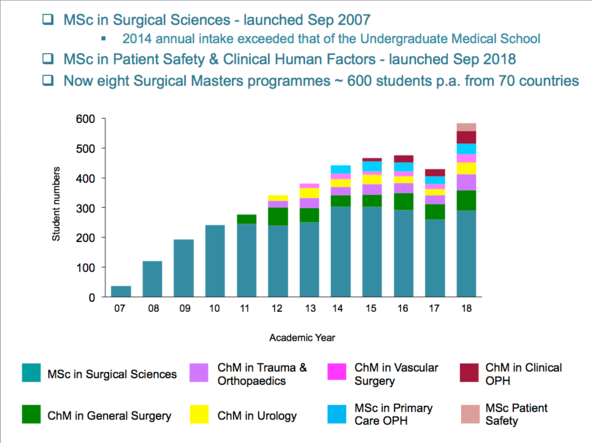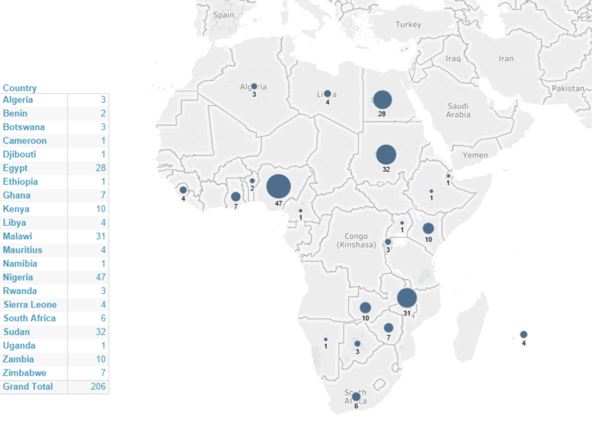event services in Edinburgh
University of Edinburgh Surgery Online
Professor O James Garden
I have been fortunate to have led the establishment of a highly successful series of online masters programme which are seen as ground-breaking. In 2007, the University of Edinburgh and the Royal College of Surgeons of Edinburgh launched the Masters in Surgical Sciences (MSc SurgSci), a novel three-year online educational programme, also known as the Edinburgh Surgical Sciences Qualification (ESSQ) and designed to support the professional and academic development of the surgical trainee. It was thought that student recruitment would come principally from Great Britain and Ireland since the programme content was based on the intercollegiate curriculum for the membership examination of the Royal College of Surgeons (MRCS). However, the MSc SurgSci and our subsequently developed masters (ChM) programmes aimed at supporting later training (FRCS equivalent), now reach a much greater global audience.
Over the last ten years, students have come from some 70 countries. In November 2018, our 1005th student graduated with a certificate, diploma or masters level qualification through the Edinburgh Surgery Online masters programmes. There are currently some 600 students from some 70 different countries enrolled in our masters programmes.

The impact of the masters programmes on surgical training worldwide has been considerable over the last ten years. This has perhaps been most marled in sub-Saharan Africa where there have been challenges in training and retaining skilled surgeons in their own country. Currently, some 200 training surgeons from Africa have been supported through their academic and professional development by the masters programmes.

Many of our international students have been innovative in securing personal financial support to meet the fees. However, a number of funding opportunities have now been made available by the Edinburgh Surgery Online team to widen access and support training surgeons particularly in low and middle income countries. The impact of our scholarship programme has perhaps been greatest in sub-Saharan Africa. Specifically, 31 Malawian trainees, have had access to full scholarship funding since 2010. Remarkably, 28 of these have been supported by educational grants principally from Johnson & Johnson. It is interesting to reflect on the fact that the origins of this global giant, was based on Robert Wood Johnson’s attendance at the lecture by Joseph Lister at the International Medical Congress held in Philadelphia as part of the Centennial Exposition in Philadelphia in 1876. The current educational support from Johnson & Johnson has allowed 16 surgeons to graduate from the University of Edinburgh with an MSc degree in Surgical Sciences. All 16 have remained in Malawi helping to support important attempts to capacity build in a country that currently has fewer that 20 qualified general surgeons for a population of some 17 million.
It is estimated that Joseph Lister taught some 1600 students in his time in Glasgow and Edinburgh between 1856 and 1877. During that same period he trained 192 ‘dressers’. It is truly remarkable that our online masters programmes have achieved a much greater global outreach with over 1500 training surgeons having enrolled in our programmes in half the time! While the masters courses, will never replace entirely in-the-workplace experience, their ability to meet the academic and professional development of surgeons in training has helped greatly to ensure a high standard irrespective of the quality of the training environment in which they are based. The innovative nature and quality of the programmes was recognized when I was awarded the University of Edinburgh Chancellor’s Award for Teaching by the Duke of Edinburgh at Holyrood Palace in 2010. The programme was also awarded the Queen’s Anniversary Prize for Higher and Further Education at an investiture at Buckingham Palace in 2014.
The recruitment of training surgeons to the masters programmes has increased year on year and there are few parts of the world in which we have not supported the training of surgery. Scholarship opportunities have been extended to trainees in low and middle income countries by ring-fencing programme income to widen access through full funding of scholarships. Last year, twenty such Edinburgh Surgery Online Global Scholarships were provided to support training surgeons from the World Bank list of low and middle income countries coming from East Asia, sub-Saharan Africa and Latin America. Last year, we have also secured support from Women and Health Alliance International to fund a female training surgeon in Benin. For 2019, we have secured Commonwealth Commission funding for 10 successful applicants and it is anticipated that funding will again be made available for an additional 20 fully funded Edinburgh Surgery Online Global Scholarships.
Online education in medicine is increasing and here to stay. It will continue to complement innovation in surgical care and training. I am pleased that Edinburgh has been very much at the forefront of its development and remains a global leader in this area.

